From May 26 to June 6, 2024, Professor Wensheng Han, Chair the School Council of the School of Juris Master, successfully led a delegation to visit Bocconi University, the University of Brescia, and the University of Venice in Italy, as well as the University of Paris I and the University of Montpellier in France, and Osnabrück University in Germany. Delegation members included Professor Wensheng Han, Professor Zhihui Liu, Associate Professor Jiahua Zhang, Dr. Jian Huang, Dr. Yaqi Ding, and Dr. Xian Zhang from the School of Juris Master. Additionally, Professor Qian Tao that had been participating in an overseas advancement program in Italy, attended the exchange activities with Italian universities.
On 27 May, 2024, the delegation visited Bocconi University's School of Law, where they were warmly welcomed by Dean Professor Pietro Sirena, Professor Maria Lilla Montagnani, and Professor Mariateresa Maggiolino. The meeting began with an introduction by Dean Professor Pietro Sirena, who provided an overview of the school's history, global rankings, curriculum, and teaching methodologies. Professor Wensheng Han followed with an introduction to China University of Political Science and Law (CUPL) and the School of Juris Master. The formal academic meeting commenced with keynote speeches by Professor Zhihui Liu and Dr. Xian Zhang.
Professor Zhihui Liu's presentation, titled ‘Deconstructing Corporate Data Rights Ownership’, highlighted the growing importance of data as an essential corporate asset in the digital economy. She discussed the multiple points on the nature and content of data rights, as well as controversies surrounding the rights holders. Prof. Zhihui Liu pointed out that the current post-event regulatory approach under tort law, including property rights, intellectual property rights, and anti-unfair competition, is insufficient for comprehensive corporate data protection. She proposed exploring a dual-layer structure combining property and obligations-based rights to better address corporate data protection.
Dr. Xian Zhang gave a presentation on ‘Data Intellectual Property Protection’. She focused on the concept, rationale, and necessity of establishing data intellectual property protection, emphasizing the urgency of building a dedicated system in the context of the digital economy. Dr. Xian Zhang discussed the alignment of data with intellectual property frameworks while addressing data's unique characteristics and proposed the establishment of a specialized legal system for data intellectual property protection.
Professor Maria Lilla Montagnani of Bocconi University responded to the speeches by introducing key viewpoints and practices in data protection and data intellectual property within Italy and the EU.
Professor Qian Tao compared the legal education systems and master's degree training models between China and Italy, supplementing and summarizing the discussions. Professor Montagnani and Professor Maggiolino invoved in in-depth discussion with the delegation on the internationalization of legal talent cultivation, including curriculum design and global perspectives.
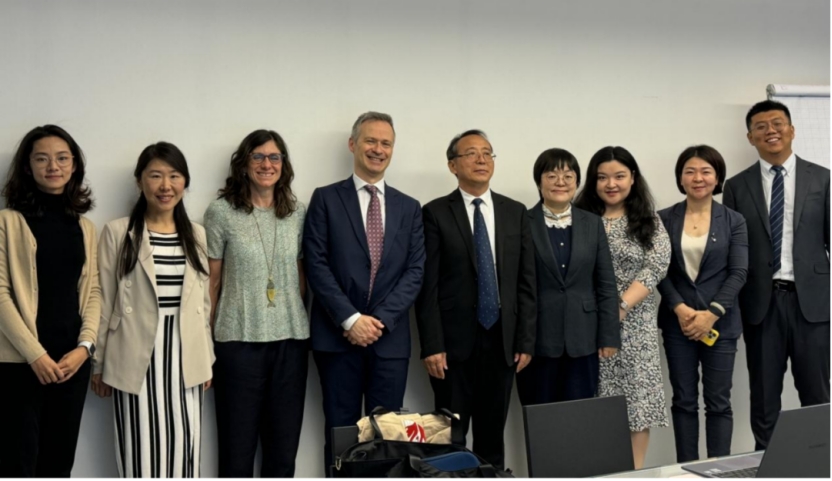
The delegation also visited the University of Brescia's School of Law on 27 May 2024, where they were hosted by Professor Stefano Porcelli, Professor Giorgio Pedrazzi, and Professor Marco Podetta. The academic meeting commenced in a roundtable format.
Professor Giorgio Pedrazzi provided an overview of the history and programs of the School of Law at the University of Brescia. Professor Wensheng Han deliver a brief of the CUPL and the School of Juris Master.
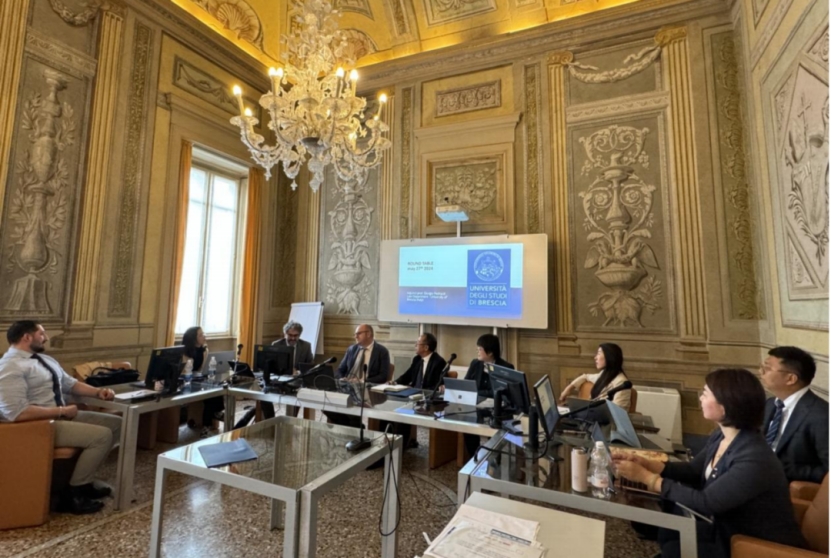
The roundtable discussion focused on the protection of personal information rights and China's smart justice practices, with keynote speeches by Professor Zhihui Liu and Dr. Jian Huang.
Professor Zhihui Liu delivered a presentation on Protecting Personal Information Rights from a Civil Law perspective. She outlined China's legislative efforts to establish a robust legal framework for personal information protection, complemented by multi-level regulatory systems and enterprise self-regulation. Professor Zhihui Liu highlighted ongoing challenges, including the applicability and enforcement of regulations, the effectiveness of administrative supervision, and the limitations of enterprise self-regulation. She called for further international cooperation to address these challenges.
Dr. Jian Huang presented on ‘The Practice and Innovation of Smart Justice in China’, introducing the development of smart courts and innovations in judicial practices. He addressed challenges such as data quality and the "black box" issues of AI applications, proposing cautious and human-centered approaches to integrating technology into judicial systems.
The professors from Brescia University responded with their knowledge and thoughts on data application and AI in judicial practices. Professor Pedrazzi and Professor Porcelli emphasized that while databases enhance uniformity and predictability in judgments, the application of AI in judicial systems must proceed cautiously to maintain the centrality of human judgment.
Professor Marco Podetta shared his views from a legal practitioner's perspective, highlighting differing attitudes between private and public lawyers toward adopting new technologies. He pointed out that while machines are objective, their operation is ultimately determined by humans, and thus their use does not inherently enhance fairness in the judiciary system.
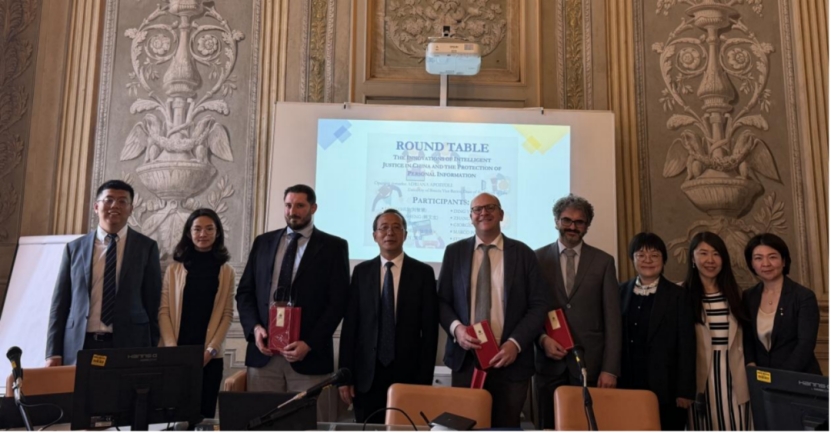
On May 28, the delegation visited the Faculty of Law at the University of Venice in Italy, where they received warm welcome by Professor Renzo Cavalieri and Professor Giorgio Fabio Colombo.
First, Professor Renzo Cavalieri introduced the legal programs at the University of Venice. He highlighted that, due to Venice's long-standing history in commerce, economics, and management, its commercial law has achieved significant development and played an essential role in the teaching and dissemination of East Asian languages and cultures. Professor Wensheng Han then provided an overview of the CUPL and the School of Juris Master.
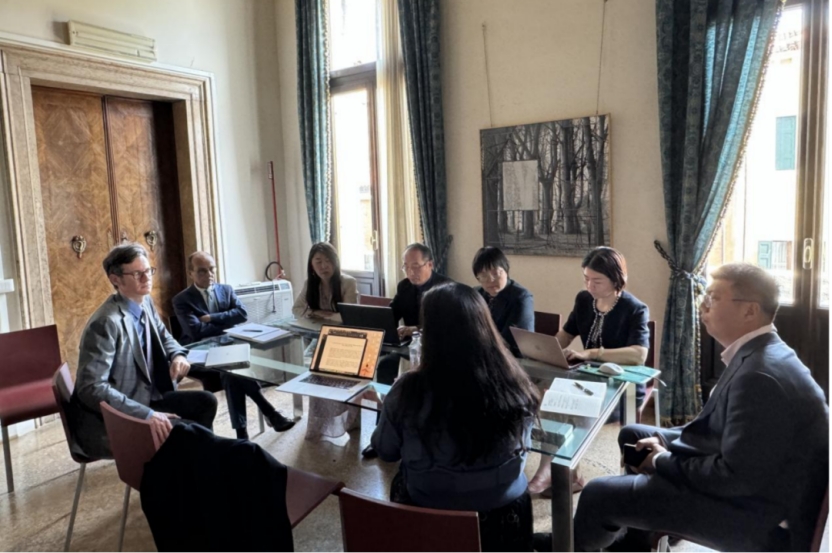
During the academic session, Professor Renzo Cavalieri and Professor Giorgio Fabio Colombo from the University of Venice, along with Dr. Xian Zhang and Dr. Yaqi Ding from the School of Juris Master, delivered keynote speeches.
Professor Giorgio Fabio Colombo focused on issues related to international commercial arbitration. He outlined the complex nature of international commercial arbitration, discussing challenges such as the lack of unified rules, maintaining confidentiality, and the tension between technical arbitration and cultural localization. He also analyzed potential rooms for improving arbitration rules.
Professor Renzo Cavalieri discussed Italy's approach to foreign investment control and shared his perspectives on the issue. He pointed out the need to balance national security concerns with the introduction of foreign investment, using Italy's "Golden Power" legislation as an example to illustrate the scope of national review authority, review processes, and actual examination rates. He also introduced relevant Italian investment laws and identified trends such as strengthening reviews and increasing subjectivity in government review standards. Globally, he noted a growing trend toward stricter scrutiny of foreign investments while emphasizing the importance of balancing economic development with regulatory oversight and enhancing legal understanding of the issue.
Regarding Italy's foreign investment policies, Professor Qian Tao introduced relevant legislative developments and shared insights based on China's current outbound investment practices.
Dr. Xian Zhang delivered a presentation on challenges and strategies for Chinese enterprises facing overseas intellectual property (IP) litigation. She identified two main sources of IP litigation: lawsuits filed by foreign enterprises against Chinese companies for IP infringement (e.g., trademark and copyright cases involving cross-border e-commerce, patent infringement lawsuits from European and American companies) and cases where Chinese enterprises seek to protect their IP rights abroad. These issues, she argued, significantly affect Chinese companies' international reputations and result in substantial economic losses. Dr. Xian Zhang proposed that addressing such challenges requires a dual approach: understanding the unique IP laws of different jurisdictions and fostering IP innovation while strengthening the development of legal talent specialized in IP. She highlighted the evolution of China's IP protection system, emphasizing the shift from "borrowing" to "autonomy," and stressed that enhanced IP protection aligns closely with China's economic, social, and cultural interests.
Dr. Yaqi Ding discussed the new developments in China's new Company Law. She analyzed key changes such as clauses for corporate social responsibility, special provisions for state-owned enterprises, enhanced shareholder contribution responsibilities, optimized corporate governance structures, and increased accountability for actual controllers. Based on these changes, she examined the implications for foreign-invested enterprises, including adjustments to company charters, reforms in systems such as capital contributions and liquidation, and compliance transitions in governance models and capital structures.
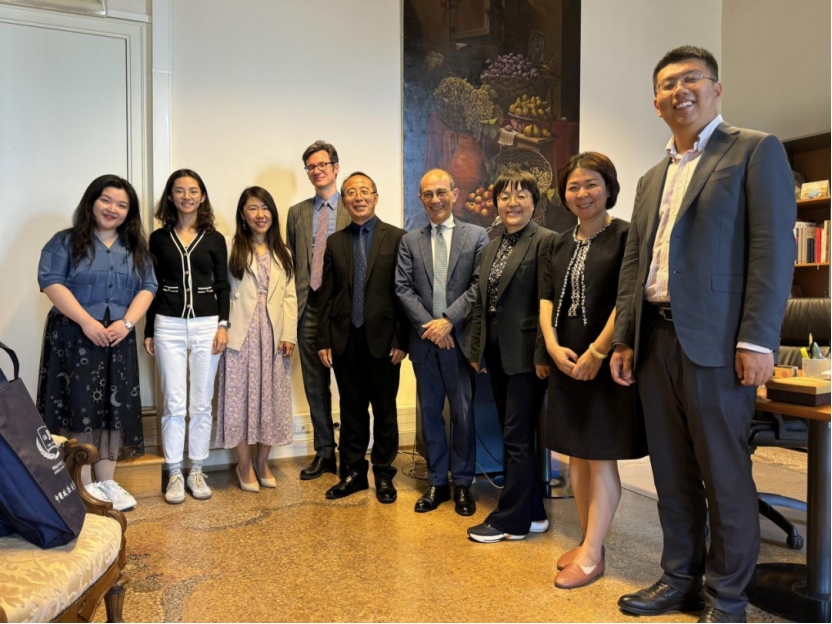
On May 30, the delegation visited the School of Law at Paris 1 Panthéon-Sorbonne University in France. Professor Eugénie Mérieau and Professor Linxin He hosted the delegation, and the discussions on legal education.
Professor Eugénie Mérieau gave a keynote speech on the teaching of constitutional law courses in French law schools. She noted that constitutional law is a four-credit compulsory course for first-year law students and elaborated on its pedagogical approach and curriculum design. She suggested integrating the historical narrative of France as a teaching principle while selectively introducing comparative law topics, such as the constitutions of the United Kingdom and the United States. She also proposed diversifying the content of constitutional law courses to enhance their inclusivity.
Professor Linxin He focused on the foundational course ‘General Introduction to Law’, discussing its teaching objectives and the rationale for choosing private law as the foundation of legal education. He explained that the course aims to help students understand law from social sciences and philosophy, and private law's roots in Roman law establish its foundational status. He advocated for incorporating public law content into the course to better achieve its teaching objectives.
Professor Wensheng Han delivered a speech titled ‘Integrating Constitutional Ideals into Legal Professional Ethics: A Case Study of Prosecutorial Ethics’. He traced the origins of modern prosecutorial systems to the French Revolution and Napoleon's Code of Criminal Procedure. Han analyzed five core aspects of prosecutorial ethics: loyalty, public service, responsibility, objectivity, and integrity.
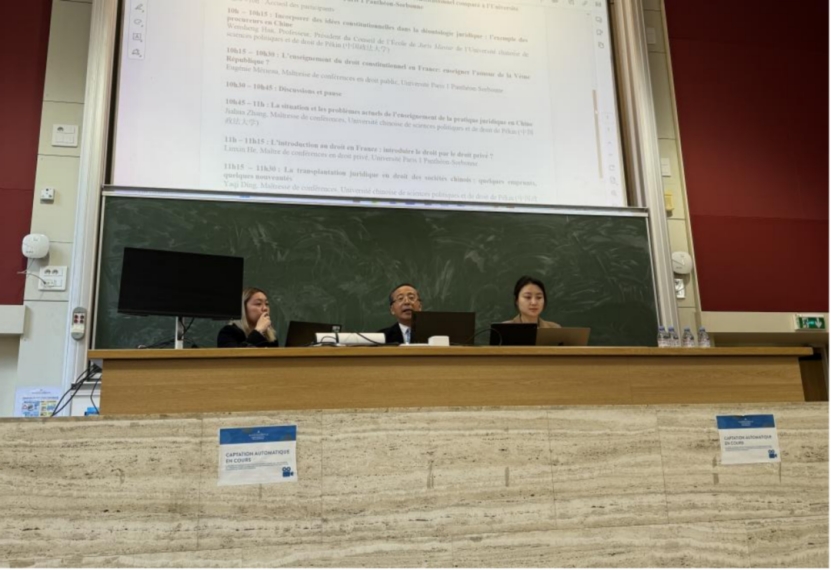
Associate Professor Jiahua Zhang addressed the current state and challenges of practical legal education. She emphasized that practical education is fundamental to legal training and essential for legal education reform in China's new era. She identified existing issues, such as the homogenization of practical and theoretical courses, overlapping functions of different practical courses, insufficient implementation of some practical courses, and a lack of realism in practice-based teaching. She shared the School of Juris Master’s experience with its "dual-teacher system" as an example of innovative practice in legal education.
Dr. Yaqi Ding presented on the exploration of commercial law teaching from a comparative perspective. She highlighted the technicality and convergence of international commercial law systems and their profound impact on commercial law education. At the same time, she stressed the need to balance the internationalization of commercial law with its local relevance. Using examples from corporate governance, she illustrated how globalization has influenced commercial systems while also noting the importance of reflecting national characteristics in teaching. Dr. Ding argued that commercial law education should convey legislative intent, regulatory frameworks, and system design while avoiding methodological blind spots in comparative law to bridge the gap between international norms and local practices.
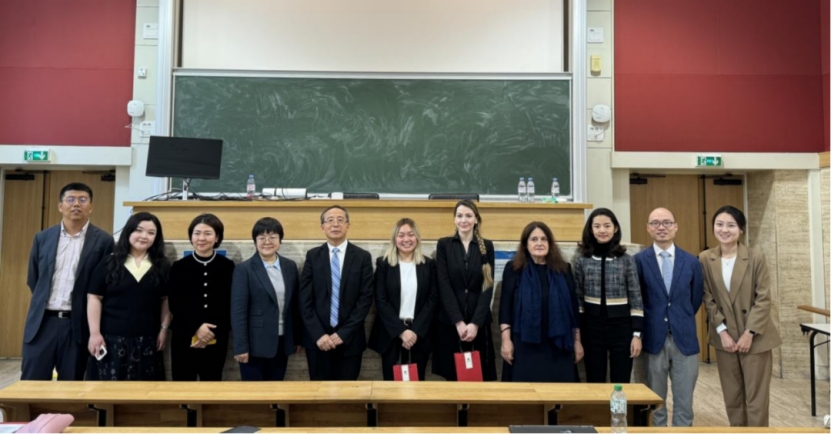
The delegation visited the Faculty of Law at the University of Montpellier in France on 1 June 2024, where they were warmly hosted by Professor Pierre Mousseron, Professor Aurélie Brès, and other faculty members. The two sides commenced discussions on the teaching of customary law from Sino-French perspectives.
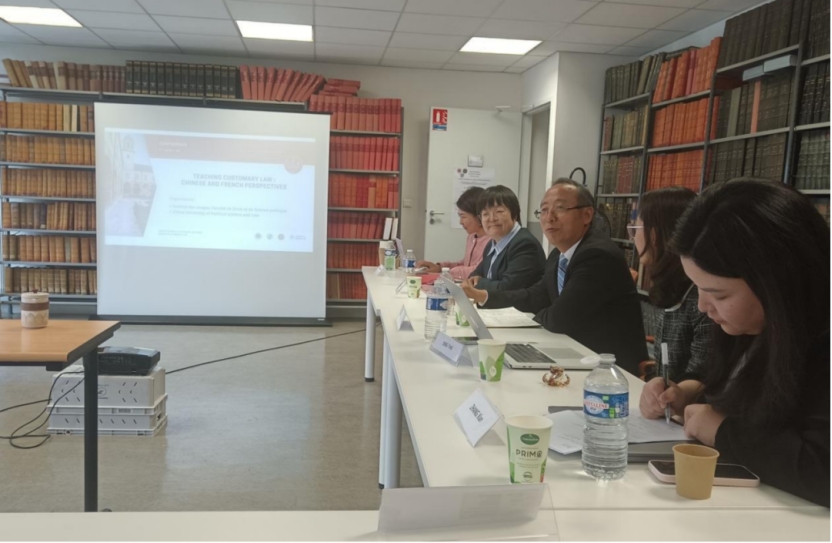
Professor Pierre Mousseron began by presenting the history of teaching customary law at the University of Montpellier. He provided a comprehensive overview of the evolution of customary law, tracing its recognition during the Middle Ages, the opposition it faced during the French Revolution and Napoleonic era, and its remnants in modern teachings. He emphasized two key characteristics of customary law: its diversity and its resilience. Lastly, he shared his outlook on the future development of customary law.
Next, Professor Christian Zendri from the University of Trento in Italy shared his perspectives on Jacques Rebuffi and customary law. He primarily introduced the origins of customary law, analyzed the distinctions between codified and customary law, and highlighted the challenges in teaching customary law.
Professor Aurélie Brès delivered a speech on the teaching of French corporate customary law, focusing on why and how it is taught. Through case studies, she analyzed the application of customary law and argued that it is a significant and fascinating topic both theoretically and practically. She emphasized that teaching is a vital means to promote the application of customary law.
Professor Zhihui Liu gave a speech on the origins of Chinese civil customary law. She outlined three stages in its development: the phase where society was purely governed by customs, the coexistence of customary law and codified law, and the dominance of codified law alongside a revival of customary law. She explained that since the 1980s, China has undertaken a series of legal reforms and the establishment of a modern legal system, including the reintegration of certain customs into formal legal frameworks. From Confucian philosophy to the modern legal system, customary law has played a pivotal role in shaping Chinese society. With the advancement of the rule of law and societal development, China's civil legal system will continue to seek a balance between tradition and modernity. This presentation sparked widespread interest among the attending scholars, leading to in-depth exchanges and discussions on Chinese philosophical and Confucian thought.
Dr. Yaqi Ding analyzed the role of customs in commercial law by examining its development and distinctive characteristics. She pointed out that during the transformative period of modern Western legal systems, factors such as the evolution of merchant guilds, inadequacies in Roman, canon, and feudal laws to address commercial practices, and the outdated procedures and evidence rules of traditional courts contributed to merchant self-governance. This autonomy further promoted the independent development of commercial law. In many countries, commercial customs preceded the emergence of commercial laws. As such, commercial law, a practical branch of legal studies, originated from commercial customs and practices. She also noted that even under the Civil Code, which incorporates some commercial law rules, codified civil rules are inevitably limited. She raised the question of how to appropriately position commercial customary law in addressing gaps in commercial-specific laws while considering the unique features of commercial practices.
Dr. Xian Zhang delivered a thematic speech on the application of customary law in IP law courses. Her presentation was divided into two parts. The first part introduced topics in IP law education related to customary law, such as understanding public order and morality in applying the principle of interest balancing, with examples like the patentability of genetically modified animals. The second part discussed the understanding of customary law in the context of traditional knowledge protection. She emphasized that traditional knowledge, including traditional cultural expressions, has strong communal attributes and spiritual connections to communities. Thus, customary law plays a crucial role in understanding these issues, including defining "tradition" and designing protection pathways that respect traditions. She noted that this topic is primarily taught in graduate-level courses and suggested integrating cultural studies to better understand customary law perspectives in teaching.
Associate Professor Jiahua Zhang spoke on the application and teaching of Chinese customary law. She highlighted its role within the national legal framework as a supplement to formal legal norms, contributing to social order, conflict resolution, balancing interests, and maintaining community harmony and stability. She elaborated on the conditions for applying customary law, specific situations where it does not apply, and provided examples. She then shared insights on the teaching of customary law in China, covering its significance and value, curriculum content and design, teaching methods, challenges, and solutions.
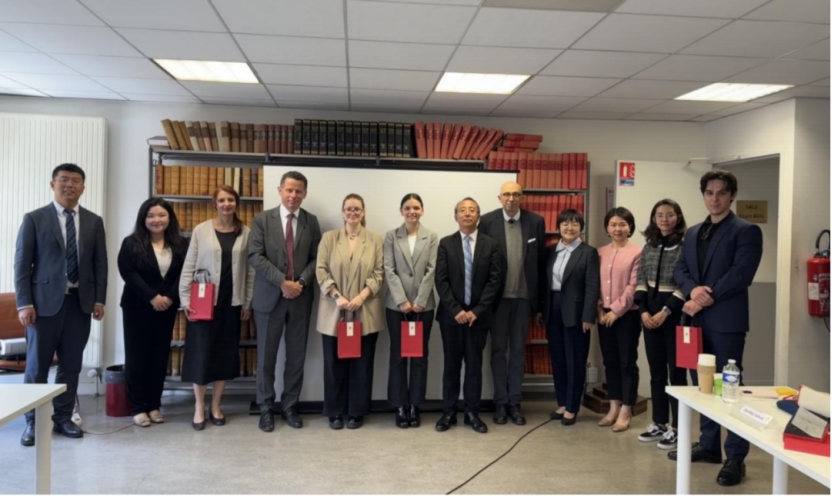
The delegation visited the Faculty of Law at Osnabrück University in Germany on 3 June 2024, where they were warmly welcomed by Professor Georg Gesk and Professor Christoph Busch.
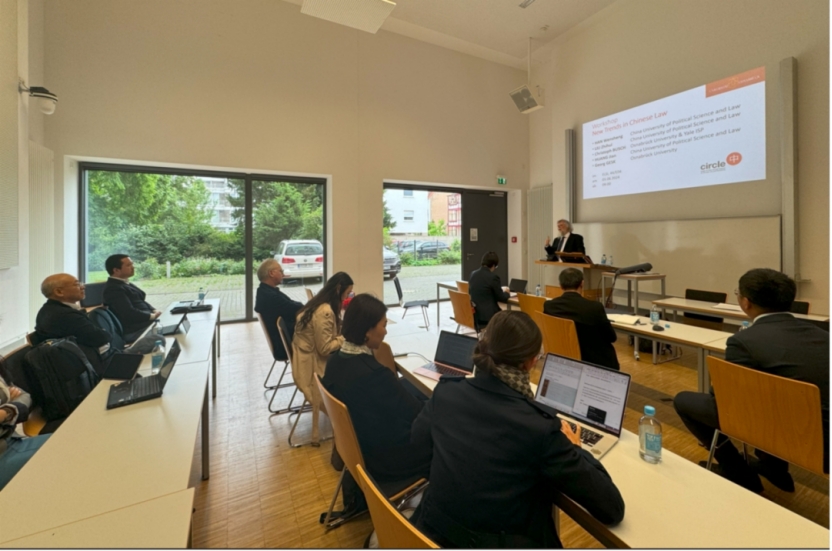
The session began with Professor Wensheng Han introducing the history, legal programs, and employment prospects of CUPL and the School of Juris Master. He then delivered a speech titled ‘AI and the Transformation of Legal Education’. Professor Wensheng Han pointed out that the widespread application of AI technology is profoundly reshaping relationships among people, nature, and society, enhancing humanity’s ability to understand and transform the world. While AI poses challenges, it also offers new opportunities for legal education, which must embrace and integrate AI to drive reform. He proposed the following points:
Integrate intelligent technologies into legal education by updating curricula and teaching content.
Tailor teaching approaches to individual students through intelligent platforms, evaluation systems, and legal AI assistants.
Utilize legal education to support, promote, and regulate AI development for the benefit of humanity.
Leverage AI to advance equitable development in legal education and foster internationalization and globalization.
Promote human-machine collaboration in legal education, encouraging law teachers to enhance their proficiency in AI tools and integrate them into teaching, fostering innovation, and cultivating future legal talent.
Professor Zhihui Liu gave a keynote speech titled Reflections on AI Legislation. She introduced the necessity, current status, challenges, and future directions of AI legislation. Professor Zhihui Liu highlighted potential risks and uncertainties, such as privacy breaches, data misuse, and algorithmic discrimination, which pose new challenges to individual rights, social order, and national security. Drawing on international legislative practices, she identified three major challenges in AI legislation: the tension between technological complexity and legal adaptability, balancing ethics and law, and fostering international cooperation and coordination. She emphasized four key areas that require attention: data protection and privacy, algorithm transparency and fairness, AI product liability and safety, and AI ethics and societal impact.
Professor Christoph Busch discussed how EU consumer law addresses and adapts to the "chatbot economy." Using examples such as Siri's interaction with users about phone bills, Amazon's Rufus, and OpenAI chatbots, he analyzed how chatbots could revolutionize the economy while simultaneously posing challenges to consumer law in terms of empowerment and protection. He also introduced the European Law Institute project on algorithmic contracts and its eight principles. Professors Han Wensheng and Dr. Huang Jian posed questions and exchanged views on algorithmic data disclosure and AI legislative foresight.
Dr. Jian Huang delivered a keynote speech on ‘Exploration and Practice of China's Non-Prosecution Compliance System’. He provided an overview of corporate crime and emphasized the growing importance of corporate compliance and non-prosecution. He traced the historical evolution and development of China's non-prosecution compliance system, analyzed its key elements and practices, and introduced relevant legislation, challenges, and future directions.
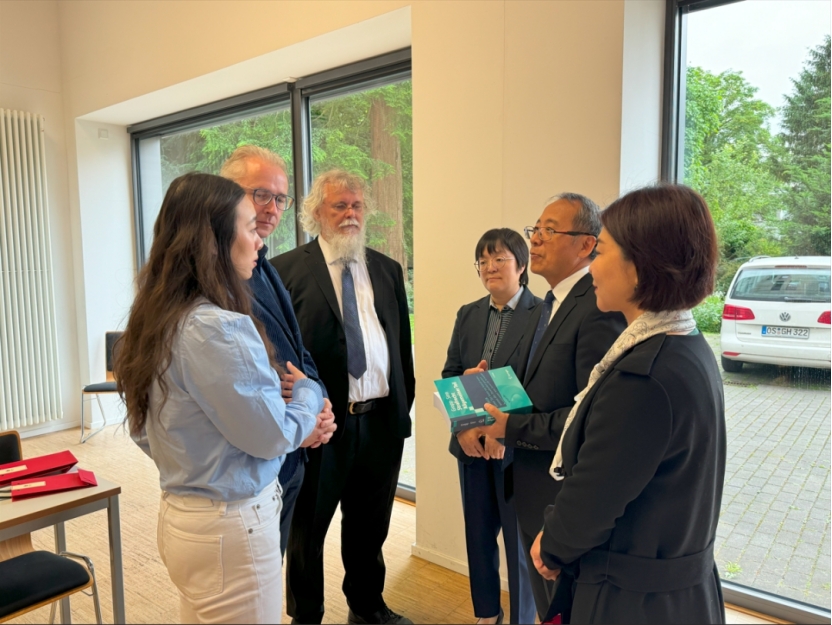
The delegation successfully completed its goals, achieving fruitful outcomes. This visit strengthened ties between the School of Juris Master and law faculties in Italy, France, and Germany, broadened its international outlook, enhanced its global influence, and advanced the internationalization of its teaching and research initiatives.